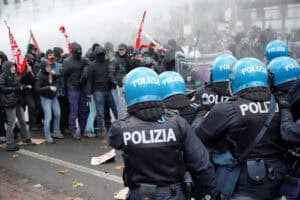Strongmen in the Middle East and North Africa will be eyeing warily popular protests, fed by frustration with living standards and an elite perceived as corrupt, that helped push veteran Algerian president Abdelaziz Bouteflika and now Sudan’s Omar al-Bashir from power.

While recent events in Algeria and Sudan have been unique to those countries, analysts say the rapid downfall Bouteflika and Bashir are a warning to authoritarian leaders in the region that they will ignore popular anger, especially over economic grievances, at their peril.
The Sudanese army said Thursday that Bashir had been removed from power and detained after 30 years in power following four months of protests. Last week, mass protests led Algeria’s ailing Bouteflika to step down last week after 20 years.
In both situations, longtime rulers were pushed aside by existing security structures on the back of mass protests, in a sign for authoritarian leaders that an army can be a foe as well as a friend.
But this also dashed popular hopes for a true revolution, leaving a potential for further instability.
And as populations surge in the region, with the demographic switching towards a younger, more digitally savvy generation, discontent may deepen further.
– ‘Lesson for autocrats’ –
“The Algerian and Sudanese contexts are very different indeed. But at the same time, there is a lesson here for autocrats and dictators, that the craving for justice, democracy, and equal opportunities is universal,” said Marc Pierini, visiting scholar at Carnegie Europe.
. AFP/Alexander NEMENOV
“In both countries, people are fed up by seeing the people sitting in power, calling all the shots, and pocketing the money,” said Pierini, a former EU ambassador to Tunisia and Libya, Syria, Morocco and Turkey.
“It is also interesting that armed forces are not necessarily solidly behind these autocrats anymore and perhaps have a longer view,” he told AFP.
Algeria’s neighbour Morocco is run by a monarchy while heavyweight Egypt is headed by strongman President Abdel Fattah al-Sisi, a former army general.
He came to power after the ousting of Islamist Mohamed Morsi who himself was elected into power after the uprising that felled longtime autocrat Hosni Mubarak.
– ‘Looking on with worry’ –
Sharan Grewal, a postdoctoral fellow at the Center for Middle East Policy at the Brookings Institution, said it was difficult to predict whether the latest convulsions would trigger a repeat of the 2010-11 Arab Spring protests that ousted regimes in Egypt and Tunisia and led to war in Syria and Yemen.
“That said, revolutions do tend to occur in waves,” he said, citing the Arab Spring and the so-called colour revolutions in post-Soviet states like Ukraine and Georgia in the previous decade as well as the fall of Communism in eastern Europe in 1989.
. AFP/AHMED MUSTAFA
Noting that the demands of the protesters to beat corruption and improve living standards resonate beyond Sudan and Algeria, he added: “You can be sure that dictators across the region are looking at these uprisings with worry.”
Haim Malka, senior fellow and deputy director of the Middle East Program at the Center for Strategic and International Studies (CSIS), said regimes have been “slow to grasp and adjust to a combination of demographic, technological and economic shifts”.
“The region will face more turbulence as citizens and regimes attempt to renegotiate the contours of the social contract,” he told AFP, adding: “It will take years” for a new equilibrium to emerge.
– ‘Between a rock and a hard place’ –
The tremors in Algiers and Khartoum will reverberate well beyond the Middle East.
Another strongman to leave the stage this spring was Kazakh president Nursultan Nazarbayev, who stepped down in what analysts saw as a bid to ensure a controlled power transition at a time of increased economic uncertainty.
President Recep Tayyip Erdogan, whose ruling party lost control of Turkey’s two biggest cities in March polls and is now contesting the results in Istanbul, will be watching events in Sudan particularly closely after hosting Bashir on multiple occasions in defiance of an International Criminal Court (ICC) arrest warrant.
And even when a leader is removed from power it’s far from the end of the story.
Anthony Skinner, director at Verisk Maplecroft risk assessment firm, said Bouteflika’s interim successor Abdelkader Bensalah was “between a rock and a hard place” as he sought to cater to the demands of protestors while ensuring stability.
“I expect protestors to sustain pressure on the political elite,” he said, even as police resort more to water cannon, tear gas and truncheons.
“The administration wants to stick to the current roadmap without having to make further concessions,” he said.






